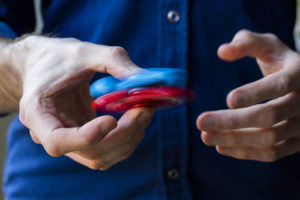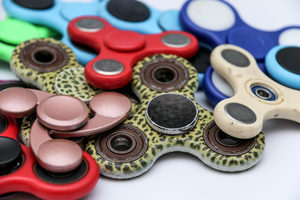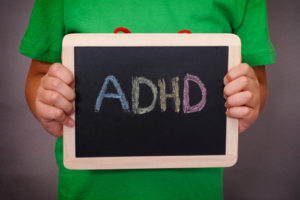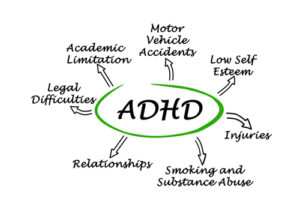
Why all the fuss about fidget spinners?
This year’s summer fad, in Ottawa and around the world, isn’t an exotic toy or a video game. It’s a little, metal device that spins.
That’s right. It spins.
How much entertainment could spinning really provide, in this age of virtual reality mainstreaming and endless Netflix streaming content at our fingertips?
Well, there’s a bigger benefit being promised:
- It helps you focus
- It helps with anxiety
- It helps you fight through Attention Deficit Hyperactivity Disorder (ADHD)
Allegedly.
Though fidget spinners have only been a fad for a matter of months, research is piling up against the argument that these are miracle toy cures for ADHD or other conditions.
Should you jump on the fidget spinner bandwagon? Or if you’re already on, should you be looking for your exit strategy? Read on to find out.
Spinner Benefits: The Good, Bad & Ugly
 These small, ball-bearing-driven devices have been a hot item for months now. Their purpose is to provide a “calming effect” that “helps you focus.” And you can “entertain yourself for hours.”
These small, ball-bearing-driven devices have been a hot item for months now. Their purpose is to provide a “calming effect” that “helps you focus.” And you can “entertain yourself for hours.”
On that last part, we can agree. It’s been entertaining for us to read all these claims made by makers and retailers of the myriad fidget spinners that have flooded the market.
“You can bring them anywhere,” say the sellers. Well, that much is true. Except for classrooms (where more and more teachers are banning them due to distraction). And maybe airport security. (nope, we checked with the TSA, and apparently they’re okay with it, though your mileage may vary)
Fidget spinners “eliminate anxiety,” another claim purports. Um… no.
They “help kids and adults with the struggle against ADHD.” We’re struggling not to include an eyeroll emoji here.
Okay, but wait, you say, there are also reviews that seem to support these claims. Like, lots of reviews.
Fair enough. Millions of these little devices have been purchased worldwide just this year, with stores and manufacturers racing to keep up with demand. Buyer feedback on retail sites like Amazon hasn’t been all bad; plenty of four- and five-star reviews, in fact, with some interesting feedback and observations. We’ll get into that in just a little bit.
So what kind of benefits are fidget spinners supposedly delivering?
“It could very well improve your day-to-day by giving you an innocuous outlet for your nervous or bored energy, and our testers unanimously found this to be true.” This was the finding of a recent article in Forbes magazine, documenting the fidget spinner craze. But a good one will cost you a pretty penny, the article notes before dropping this:
Counterintuitively, the spinners’ potential to get gritty, their high price tag, and how easy it is to notice when they’re spinning even slightly below par, can create a kind of anxiety in the type of user that needs things to run perfectly. This is exactly the opposite of what the spinners are designed to do.
Every Spin Has a Flip Side
Okay, so the claims are out there. People are talking about fidget spinners. And like most other Internet sensations, it’s important to separate the facts from the myths.
The “innocuous outlet for nervous or bored energy” touted by the Forbes piece? That was written back in December, when the craze was just getting off the ground.
The findings since have been problematic.
First off, the praise for fidget spinners has been largely anecdotal. No peer review has taken place. There is no solid scientific evidence that fidget spinners have a long-term positive effect on anxiety or ADHD.
What is coming out, as the spinners have gone viral, is that that the potential for distraction is real. That’s completely counter to the “solution to ADHD” argument. The last thing kids (or adults) with ADHD need is more distraction! As such, teachers are banning the devices in classrooms across the world.
“It’s important for parents and teachers who work with kids who have ADHD to know that there are very well studied and documented treatments that work,” says Duke professor Scott Kollins. “There’s not really quick and easy fixes like buying a toy.”
We couldn’t agree with that more. Being trained counsellors with years of experience in the treatment of ADHD, anxiety and other disorders, we must underscore that a quick fix simply doesn’t exist. Furthermore, fidget spinners don’t just fall short on their claims, they actually end up working against the user, not in their favour.
“They’re very much a distraction, not only to the child, but it distracts people from doing something that we know works,” says Dr. Mark Stein, director of ADHD and related disorders at the Seattle Children’s Hospital and professor at the University of Washington.

But… What About Those Good Reviews?
As promised, let’s take a look at those reviews. Indeed, there are some good ones. User reviews of various fidget spinners show people reporting that their attention span has increased, that they feel less distracted and anxious, and even more focused and productive.
We’re not saying people aren’t actually enjoying themselves. And they might be perceiving some of the alleged benefits of the product. Only we’ve already debunked those claims, so how does that happen?
In business, a buyer can experience something called “ex post facto justification.” This happens when one buys something by impulse or lack of transparent information, then tries to rationalize the purchase after the fact by convincing themselves that it was the right thing to do.
Maybe you bought a fidget spinner because everyone else was buying one. Maybe you spent more than you wanted to. In the wake of that, you wouldn’t want to feel badly about the purchase. It’s natural to want to avoid feelings of shame or remorse. So this process of justification is our mechanism against that.
Eventually, however, most people will probably get bored of this toy. Just like most other fads. If there aren’t actual benefits to be realized, we move on.
So… it’s psychosomatic? All made up? The benefits aren’t real?
In a nutshell, yes. The benefits can’t be sustained because they’re not real. The “placebo” effect lasts a little while, but eventually it wears off. And eventually what you’re left with is a funny-looking metal thing that spins.
And as for toymakers and retailers trying to capitalize on a mental health disorder? “It is worrisome that business is entering this area,” Stein adds. “Families with children with neurodevelopmental disorders are vulnerable and want to do everything they can do to help.”

Okay, If Not a Spinner, Then What?
If only it were as simple as a little toy.
As many as 6.4 million youth between the ages of four and 17 have been diagnosed with ADHD, according to the Centers for Disease Control & Prevention. We want to help make that number go down. We would love it if a spinning toy held the key to the cure. Of course, by now we know that it isn’t. Pick your cliché:
- There’s no substitute for hard work
- Good things come to those who wait
- If it looks too good to be true, it probably is
Once ADHD is diagnosed, we go through an intensive process with the patient (and their family) to determine the best course of action for them. From that point onward, the patient puts in what essentially amounts to a lifetime of work. An overnight “cure” is unheard of. In fact, “curing” ADHD isn’t really the focus, but rather “treating” it (as with any other disorder).
The beauty of ADHD lies in its tremendous upside. While it’s often said that people with ADHD have difficulty focusing (thus the marketing sensation known as the “fidget spinner”), we’ll point to the contrary. ADHD can be a gift, allowing its holder to focus for long stretches of time, a period of “hyperfocus” if you will.
We’ve got a whole article on ADHD and youth treatment that’s worth taking a look at:
http://ottawayouthcounselling.com/youth-adhd/
Spinning Down to a Conclusion
If you’re entertained by a cheap, metal toy that spins round and round on ball bearings, by all means spin away. We’re not saying don’t buy one. What we are saying is that you oughtn’t buy one with lofty expectations of a miracle ADHD solution. And be careful with the distraction that it can have.
If you’re looking for a sustainable, long-term treatment for ADHD or anxiety in Ottawa, we can help. It’s not an overnight cure, it’s not an easy process, but the time and work invested can lead to major life changes. We invite you to get in touch with Ottawa Youth Counselling.

